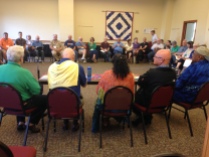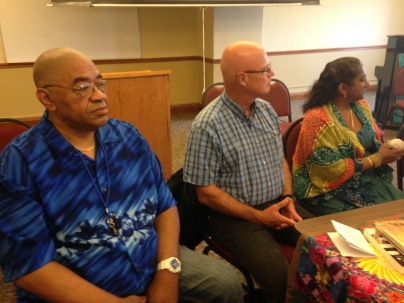Creating Two Distinct ‘Sheep and Goat’ Parables
In 2017 the title of my sermon for Christ the King Sunday (Nov. 26) is “The Smallest Huge Translation Mistake in the Bible: Creating Two Distinct ‘Sheep and Goat’ Parables,” stemming from the translation of one small word in Matthew 25:32:
All the nations will be gathered before him, and he will separate people/them one from another as a shepherd separates the sheep from the goats….
The small word at issue is autous, simply the pronoun them. The older King James and Revised Standard Versions correctly render it as “them.” But newer translations, such as the NRSV and NIV, change the meaning of the parable by rendering it as “people” — in other words, by interpreting the them as “people.” But the clear referent of them in this sentence is the subject of the first clause, “all the nations.” This may seem a small translation decision, but I propose that it has huge implications for interpreting this parable. It changes the major action from sorting nations to sorting people, directing us to imagine it as a sorting of individuals instead of a sorting of whole communities of people, ethnē, “nations.”
This seemingly small translation decision then allows or enables the Christendom eschatology of focusing on the fate of individuals in the afterlife. So instead of a parable that judges the politics and economics of empires, we get a parable that supports empires by playing the same games of sorting people into us vs. them. We get a parable that follows up the imperial, transactional practice of rewarding friends and punishing enemies with a Jesus the King who does the same thing in the afterlife. The sacred violence of empires on earth gets repeated and justified by Jesus/God for an eternity in heaven.
And I submit to you that the choice of “people” for autous greatly enables such an imperialistic reading. Yes, there is a tension with typical imperialism that Jesus’ criterion for sorting brings: the ultimate sorting into an eternal fate of heaven or hell is done on the basis of caring for the least in Jesus’ family. But the tension between imperialistic power and Jesus’ anti-imperialistic Gospel has generally melted away in light of the individualism allowed by changing the referent of autous from “all the nations” to “people.” The parable of judgment can be reduced to a matter of individuals being free to choose charitable action in order to feel better about their fate in the afterlife.
But what if Jesus’ mission as the “Son of Man,” the New Human Being of Daniel 7, is an anti-imperialistic mission of judging the systemic violence of the politics and economics of empires? What if his mission favors the least powerful in Jesus the King’s family rather than the most powerful in the imperial family? What if it is about transforming nations towards justice and not just the choice of individuals to pursue charity? Then this passage must be read as a sorting of nations, not a sorting of people — as a sorting of communities of people at the very least, and not simply people as individuals.
 Since Brian Zahnd’s A Farewell to Mars in 2014, I’ve come to see this passage as the quintessential Gospel passage on “Apocalypse,” a revelation of God’s judgment on sacralized collective human violence — that is, the systemic violence of empires and modern militaristic nations whose economics are basically about extracting resources from any nation or ‘people’ who can be overpowered. Zahnd has been a reader of Mimetic Theory and understands, first of all, that the violence is never God’s. The revelation is about God helping us to see and understand the consequences of our human violence.
Since Brian Zahnd’s A Farewell to Mars in 2014, I’ve come to see this passage as the quintessential Gospel passage on “Apocalypse,” a revelation of God’s judgment on sacralized collective human violence — that is, the systemic violence of empires and modern militaristic nations whose economics are basically about extracting resources from any nation or ‘people’ who can be overpowered. Zahnd has been a reader of Mimetic Theory and understands, first of all, that the violence is never God’s. The revelation is about God helping us to see and understand the consequences of our human violence.
How do we measure and evaluate the consequences of human violence? Given Zahnd’s reading of this judgment passage, the answer is that God is revealing the divine plan that Creation has essentially been structured “since the foundation of the world” to yield blessing when all the least are cared for. Conversely, when the least are sacrificed instead of cared for, the result is a violence that envelopes even those in power — human beings who mistakenly see power as manipulating violence toward others and away from themselves. Human brokers of power are playing with fire in doing so. Creation has been structured by God to work best for everyone, “all the nations,” when the most vulnerable are attended to instead of the least vulnerable. (This is also a reality at the origins of our species since human infants are born the most vulnerable of all creatures; it takes years for human beings to mature enough to leave the nest. Is this another argument in favor of expanded roles for women, since mothers seem to know this more experientially?) Human beings can continue to behave otherwise. We can continue to operate with a power that favors the center rather than the margins. But it will prove to be as futile as spitting into the wind. God in Jesus the Messiah is revealing a Creation that favors the margins rather than the center. “Blessed are the poor in spirit….”
Matthew 25:31-46 thus reveals the key to human flourishing (with the rest of Creation still waiting for the children of God to get our act together — Rom. 8:19-23): communities that tend to the least will flourish, while communities (“nations”) that neglect the least will be playing with the fire of their own systemic violence. This has been true since the foundation of the world.
But there have been various blockages. The primary blinder/earplug has been culture based in Sacred Violence, epitomized by empires and modern militaristic nations, which structure human community to privilege the center, sacrificing those on the margins. Mimetic Theory helps us to be clear about the unveiling of that sin of our human origins — revealing things hidden since the foundation of the world.
Zahnd’s reading of Matthew 5:31-46 has rocked my world because it helps us to be more clear about another blinder/earplug to God’s revelation of human flourishing. And I propose that this second blockage has come about as an unintended consequence of the first unveiling. For the latter begins with forgiven and repentant individuals experiencing conversion — namely, a gradual ability to step out of cultures of Sacred Violence into cultures of compassion and forgiveness. But the ‘unintended consequence’ has become Individualism, an undue emphasis on salvation around conversion of individuals at the expense of meaningfully experiencing the transformation of homo sapiens in our cultural and institutional dimensions. The New Human Being gathers the nations for judgment, not just individuals.
The seemingly small but huge translation error of autous bears witness to this blockage due to Individualism. Readers ignore the gathering of the “nations,” in favor of making it be a sorting of “people.” For conservative evangelicals, it is read as the final sorting into heaven and hell between believers and unbelievers, respectively — despite the fact that the stated measure for sorting has nothing to do with believing. For “mainline” Christians it is read as the justification to compel charity. But both readings leave “nations” off the hook. I believe this to be a symptom of the first dimension of human conversion of individuals that has led to a distortion into Individualism — often then supported by a politics of Libertarianism.
Zahnd’s reading can provide the beginning of an antidote, helping to begin the unveiling of God’s healing salvation on the level of human institutions and cultures. God in Jesus the Messiah is healing our systemic violence that neglects or sacrifices the vulnerable. The cross and resurrection of Jesus the Messiah has begun an unveiling of a human flourishing through a conversion of human cultures (the advent of God’s Kingdom!) from privileging the most powerful to a compassionate caring for the least powerful. And we will need to consider how this conversion goes well beyond individual charity to a transformation of what truly makes for successful, flourishing nations. It will require following a completely different King. It will deeply involve the politics and economics of communities, “nations,” in history.
See much more on this under the Gospel Reading on my webpage Christ the King A, beginning with an alternate translation of the entire Gospel and its explanation. Let me conclude these opening remarks with a brief preview of Zahnd’s own words:
So how does Jesus judge or evaluate nations? What criteria does he use? When we evaluate nations, we tend to do so on the basis of wealth and power — Gross Domestic Product, standard of living, strength of the economy, strength of the military. But this is not the criterion Jesus uses to judge the nations as he sits upon his glorious throne. Jesus judges nations on how well they care for four kinds of people:
The Poor. I was hungry and you gave me food, I was thirsty and you gave me something to drink . . . I was naked and you gave me clothing.
The Sick. I was sick and you took care of me.
The Immigrant. I was a stranger and you welcomed me.
The Prisoner. I was in prison and you visited me. (Matt. 25:35-36) (p. 165)
One final thought as an illustration of what I think is at stake: in 2017 President Trump and the Republican Congress are offering a Tax Cut bill. How do we measure this bill in light of a revelation of a divine economics built-in to the Creation that favors the least in God’s family? We can once again opt for a politics and economics that favors the already powerful, but this parable suggests that that will eventually result in a ‘time of punishment’ when we suffer the fiery consequences of our own systemic violence.
























































